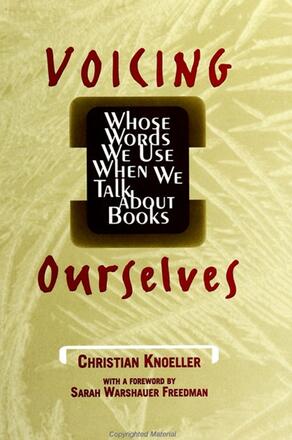
Voicing Ourselves
Whose Words We Use When We Talk about Books
Alternative formats available from:
Using Bakhtinian theory, this study reveals how and why readers routinely refer to the words and ideas of others to interpret the meanings and implications of the books they read.
Description
In a public high school classroom in the San Francisco Bay area, a group of twelfth graders have decided themselves to enroll for Advanced-Placement English. Faced with unprecedented diversity for such a class in terms of academic and ethnic backgrounds, veteran teacher Joan Cone dared to trust her students to lead their own discussions of a variety of provocative authors including Baldwin, Didion, Malcolm X, and Woolf. Voicing Ourselves examines a year's worth of such sessions, revealing how a teacher's role is transformed, and, moreover, offering an important component in any teacher's repertoire of instructional strategies: student-led discussion. Above all, the book shows the startling success of students licensed to engage one another directly in talk about books, revealing the richly social tapestry of such conversations.
Christian Knoeller is Assistant Professor of English at the University of Wisconsin, Eau Claire. He has written two books, Office Communication, a textbook, and Song in Brown Bear Country, a book of poems.
Reviews
"In Voicing Ourselves, Knoeller offers a concrete way to analyze how voices and voicing enter the writing and talk of students as they learn. He situates Bakhtin's theories alongside notions of voice put forth by composition theorists who have been writing about voice for the past several decades. In the end, Knoeller sorts through what is individual about voice--the voice that is part of our unique sense of self and our individual identity--and what is social--the voices that come from others and influence and shape who we are. Although Knoeller focuses on the interpretation of literature, the methods he develops for analyzing the influence of other voices on the individual learner could be applied to any kind of learning." -- Sarah Warshauer Freedman, University of California, Berkeley, from the Foreword
"I like the author's voice I hear--the presence I feel--as I read. The 'speaking personality' here cares very much about this work, about these students, about this teacher, about this classroom. He is genuinely interested in the interactions that occur in this community and how Bakhtin's notions of voice illuminate these. He's excited, engaged, and I am too.
"This study makes a major contribution to two areas of current interest in language education: (1) the social nature of text construction (oral and written), and (2) the potential of Bakhtin's insights for a reconsideration of classroom language events (the possibility of looking at classroom language events through a new and promising lens). The study is both insightful/creative and rigorous/disciplined. Insightfulness is the hallmark of this work." -- Judith Lindfors, University of Texas at Austin.